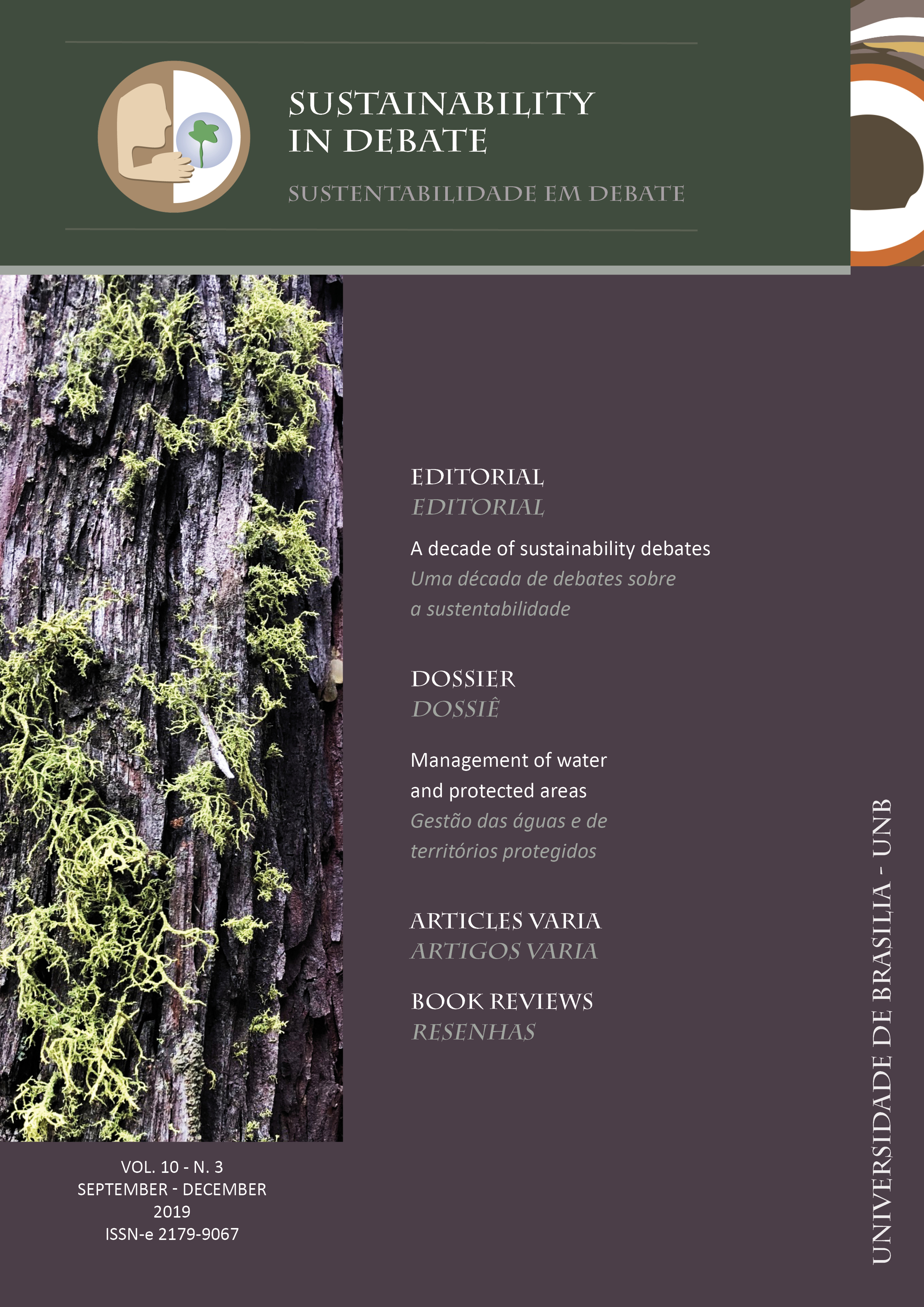International climate change negotiation: the role of Brazil
DOI :
https://doi.org/10.18472/SustDeb.v10n3.2019.2796Mots-clés :
Intergovernmental Panel on Climate Change. United Nations Framework Convention on Climate Change. Conference of the Parties. Sustainable Development. Low Carbon Agriculture.Résumé
The increase of greenhouse gases in the atmosphere raises the average temperature of the planet, triggering problems that threaten the survival of humans. Protecting the global climate from the effects of climate change is an essential condition for sustaining life. For this reason, governments, scientists, and society are joining forces to propose better solutions that could well-rounded environmentally, social and economic development relationships. International climate change negotiations involve many countries in establishing strategies to mitigate the problem. Therefore, understanding international negotiation processes and how ratified agreements impact a country is of fundamental importance. The purpose of this paper is to systematize information about how climate negotiations have progressed, detailing key moments and results, analyzing the role that Brazil played in the course of these negotiations and the country’s future perspectives.
Téléchargements
Références
BRAZIL. Brazil’s Nationally Appropriate Mitigation Actions, 2010. Available from: <https://unfccc.int/files/focus/mitigation/application/pdf/brazil_namas_and_mrv.pdf>. Accessed: 25 oct. 2019
BRAZIL. Brazil Intended Nationaly Determined Contribution (INDCs), 2015. Available from: <https://www4.unfccc.int/sites/submissions/INDC/Published%20Documents/Brazil/1/BRAZIL%20iNDC%20english%20FINAL.pdf>. Acesso em: 25 oct. 2019.
Embrapa, 2018. Visão 2030: o futuro da agricultura brasileira. ”“ Brasília, DF: Embrapa, 2018. 212 p.
FRONDIZI, I. M. DE R. L. O Mecanismo de Desenvolvimento Limpo: guia de orientação-2009. Rio de Janeiro: Imperial Novo Milênio, 2009.
IBGE, 2013. Projection of the Population of Brazil by sex and age: 2000-2060. August 2013. Available at http://www.ibge.gov.br/home/estatistica/populacao/projecao_da_populacao/2013/default.shtm, accessed on 09/09/2019.
IPCC, C. C. Climate change: the IPCC scientific assessment. New York: Cambridge University Press, 1990. Available from: <https://www.nrel.colostate.edu/assets/nrel_files/labs/ryan-lab/pubs/Melillo_et_al_1990_IPCC1_WG1.PDF>. Accessed: 25 oct. 2019.
MAAMOUN, N. The Kyoto protocol: Empirical evidence of a hidden success. Journal of Environmental Economics and Management, v. 95, p. 227”“256, 2019.
MENDES, T. DE A. Desenvolvimento sustentável, política e gestão da mudança global do clima: sinergias e contradições brasileiras. Brasília: Universidade de Brasília, 2014.
MILKOREIT, M. The Paris Agreement on Climate Change””Made in USA? Perspectives on Politics, p. 1”“19, 2019.
MIRANDA, E. E. Meio ambiente: a salvação pela lavoura. Ciência e Cultura, v. 69, n. 4, p. 38-44, 2017.
RODRIGUES, D. F.; GALVÃO, V. K. Atores e instituições na formulação da Política de Mudanças Climáticas no Brasil. Sustentabilidade em Debate, v. 9, n. 1, p. 145”“157, 2018.
RODRIGUES, R. de A. R., CONCEIÇÃO, M. C. G., BIDONE, E. D., MATOS, E. S., CORDEIRO, R. C., & SELVA, G. V. (2019). The actions of the Brazilian agricultural sector in the context of climate change negotiations. Sustentabilidade Em Debate, 10. (2), 28 - 37.
SFORNA, G. Climate change and developing countries: from background actors to protagonists of climate negotiations. International Environmental Agreements: Politics, Law and Economics, v. 19, n. 3, p. 273”“295, 2019.
SHARMA, P.; PAYAL, P. Climate Change and Sustainable Development: Special Context to Paris Agreement. 2019.
UNFCCC. United Nations Framework Convention on Climate Change, 1992. Available from: <https://unfccc.int/sites/default/files/conveng.pdf>. Accessed: 25 oct. 2019
UNFCCC. United Nations Framework Convention on Climate Change. Implementation of the Berlin Mandate, 1997. Available from: <http://unfccc.int/cop3/resource/docs/1997/agbm/misc01a3.htm>. Accessed: 25 oct. 2019
UNFCCC. Kyoto Protocol to the United Nations Framework Convention on Climate Change, 1998. Available from: <https://unfccc.int/resource/docs/convkp/kpeng.pdf>. Acesso em: 25 out. 2019
UNFCCC. Report of the Conference of the Parties on its thirteenth session, held in Bali, 2008. Available from: <https://unfccc.int/resource/docs/2007/cop13/eng/06a01.pdf>. Accessed: 25 oct. 2019
UNFCCC. United Nations Framework Convention on Climate Change. Paris Agreement, 2015.
Available from:
<https://unfccc.int/sites/default/files/english_paris_agreement.pdf>. Accessed: 25 oct. 2019
UNFCCC. United Nations Framework Convention on Climate Change. Talanoa Dialogue Platform, 2018. Available from:
<https://unfccc.int/process-and-meetings/the-paris-agreement/the-paris-agreement/2018-talanoa-dialogue-platform>. Accessed: 25 oct. 2019
UNFCCC. Report of the Conference of the Parties on its twenty-fourth session, held in Katowice from 2 to 15 December 2018. 2019. Available from: <https://unfccc.int/sites/default/files/resource/10a1.pdf>. Accessed: 25 oct. 2019
USDA. USDA agricultural projections to 2026. Washington, DC, 2017. (Long-term projections report OCE2017-1). Available from:
<https://www.usda.gov/oce/commodity/projections/USDA_Agricultural_Projections_to_2026.pdf>. Accessed: 06 oct. 2019.
Téléchargements
Publié-e
Comment citer
Numéro
Rubrique
Licence
SUSTAINABILITY IN DEBATE – Copyright Statement
The submission of original scientific work(s) by the authors, as the copyright holders of the text(s) sent to the journal, under the terms of Law 9.610/98, implies in the concession of copyrights of printed and/or digital publication to the Sustainability in Debate Journal of the article(s) approved for publication purposes, in a single issue of the journal. Furthermore, approved scientific work(s) will be released without any charge, or any kind of copyright reimbursement, through the journal’s website, for reading, printing and/or downloading of the text file, from the date of acceptance for publication purposes. Therefore, the authors, when submitting the article (s) to the journal, and gratuitous assignment of copyrights related to the submitted scientific work, are fully aware that they will not be remunerated for the publication of the article(s) in the journal.
The Sustainability in Debate Journal is licensed under Creative Commons License – Non-Commercial-No-Derivation Attribution (Derivative Work Ban) 3.0 Brazil, aiming at dissemination of scientific knowledge, as indicated on the journal's website, which allows the text to be shared, and be recognized in regards to its authorship and original publication in this journal.
Authors are allowed to sign additional contracts separately, for non-exclusive distribution of the works published in the Sustainability in Debate Journal (for example, in a book chapter), provided that it is expressed the texts were originally published in this journal. Authors are allowed and encouraged to publish and distribute their text online, following publication in Sustainability in Debate (e.g. in institutional repositories or their personal pages). The authors expressly agree to the terms of this Copyright Statement, which will be applied following the submission and publishing by this journal.









